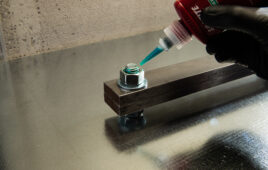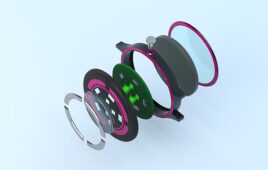Dow, provider of silicones, silicon-based technology, and innovation, has launched new, heat-resistant dielectric gels under the DOWSIL label: EG-4000, EG-4100 and EG-4120. The latest additions raise the bar for thermally stable silicone pottants for protective encapsulation of sensitive components, within SiC and GaN power modules, on printed circuit boards and in industrial sensors and actuators.
 Dow’s three new silicone gels exhibited no cracking or delamination after accelerated aging at 215° C for 3,000 hours in an air oven. In addition, their dielectric strength and mechanical properties remained stable throughout testing.
Dow’s three new silicone gels exhibited no cracking or delamination after accelerated aging at 215° C for 3,000 hours in an air oven. In addition, their dielectric strength and mechanical properties remained stable throughout testing.
“Component miniaturization and the growing adoption of power modules based on compound semiconductors are familiar trends in multiple industries, but the end result is the same for module manufacturers,” said Rogier Reinders, global marketing director for Dow Performance Silicones. “Their compact designs need to deliver ever-higher power densities and ensure reliable protection of components despite the rising internal temperatures that result,”
All of the new Dow gels are two-part, low-viscosity formulations that enable good wetting, and cure within 60 minutes at 150° C for efficient processing. After cure, they deliver dielectric insulation for the dies and interconnects within power modules and protect them from the harmful effects of moisture and other environmental contaminants. The new products also provide outstanding stress release from thermal and mechanical stresses.
Dow’s new gels range in firmness after cure to help designers find the right solution for their application:
- DOWSIL EG-4000 Dielectric Gel cures to form a comparatively softer material (with a hardness of 70g) for highly demanding stress-release applications. It maintains reliable performance at operating temperatures ranging from -60° to +215° C
- DOWSIL EG-4100 and DOWSIL EG-4120 Dielectric Gels cure to form toughened protective pottants, delivering hardnesses of 250g and 380g, respectively. Both are self-priming gels that offer increased resistance to delamination under thermal cycling. They deliver reliably consistent performance at operating temperatures ranging from -40° to +215° C
“The addition of these three new high-heat resistant silicones to our dielectric gel portfolio aims to help Dow customers stay ahead of these challenging trends, and cost-effectively meet demand for their next-generation devices,” added Reinders.
Dow
www.dow.com





Tell Us What You Think!